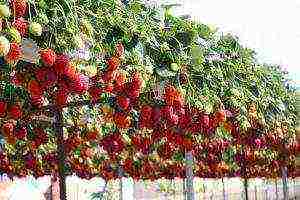Content
- 1 Preparatory activities
- 2 Crystal Growing Instructions
- 3 How to grow a crystal from copper sulfate at home (video)
- 4 1 How to grow a crystal from copper sulfate - material preparation
- 5 2 How to grow a crystal from copper sulfate - instructions and methods
- 6 3 How to grow a crystal from copper sulfate - a quick option
- 7 Preparatory activities
- 8 Crystal Growing Instructions
- 9 How to grow a crystal from copper sulfate at home (video)
- 10 What is needed
- 11 How to make a crystal: stages of work
- 12 What is needed
- 13 How to make a crystal: stages of work
Copper sulfate is a substance that, due to its beautiful bright blue color, is ideal for growing crystals. They can be presented to your loved ones or used as a decorative element. In any case, they will not leave anyone indifferent, and the manufacturing process can become truly exciting. So, how to grow a crystal from copper sulfate?
Preparatory activities
Copper sulfate can be purchased at almost any hardware store. It is actively used in agriculture for pest control. However, one should not forget that this substance is toxic. When working with copper sulfate at home, be sure to use rubber gloves and do not allow it to enter the esophagus and mucous membranes. After finishing work, wash your hands thoroughly in running water.

A real miracle can be grown from copper sulfate, but during the manufacturing process, do not forget about safety precautions
In order to make a crystal, you will need:
- water - if possible, use distilled or, in extreme cases, boiled. Raw tap water is categorically unsuitable due to the content of chlorides in it, which will react with the solution and worsen its quality;
- copper sulfate;
- Cup;
- wire;
- wool thread - make sure it is thin. Long hair can be used. Copper sulfate crystals are transparent, and the thread should not be visible through them.
When placing the seed in a container with a solution, make sure that it does not come into contact with the walls or the bottom of the container. This can disrupt the crystal growth process and its structure.
Crystal Growing Instructions
There are two technologies for growing crystals from copper sulfate.
- If you don't want to wait long, you can use the fast method. It will take about a week in time, and as a result you will get many small crystals, fixed one on top of the other, like a colony of mussel shells.
- The second method is more time consuming. It will help you grow a large, solid, gem-like crystal.
But both of them are based on working with a saturated solution of a substance.
Note! The higher the water temperature, the faster copper sulfate dissolves in it. But when the liquid reaches + 80C °, subsequent heating does not affect the solubility of salts in any way.
Fast way
- Take a 500 ml glass or jar, add 200 g of copper sulfate and fill them with 300 ml of water. Place the container in a sand bath and start heating, stirring constantly. Copper sulfate crystals must completely dissolve.
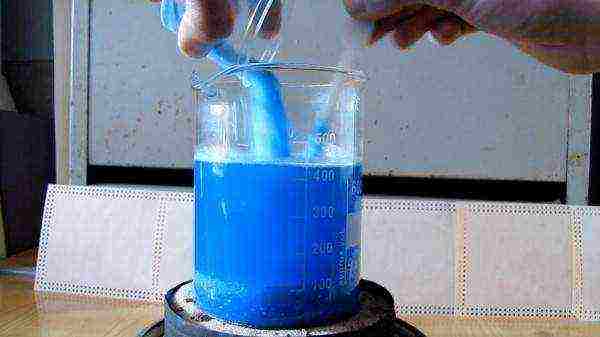
Dissolve copper sulfate thoroughly in warm water
- Remove the dishes from the sand bath, place them on a cool surface, such as ceramic tiles. The solution should cool slightly. Now you need to place a seed in it. It will serve as a crystal of copper sulfate, which must be selected in advance - the largest and evenest.
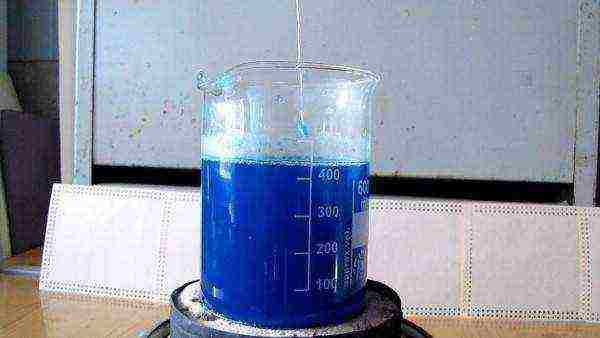
Place the seed in the solution
- Make sure that the seed does not come into contact with the inside of the glass. Even if the crystal dissolves, don't worry - it doesn't matter. When cooled, the saturated solution gives off salts that settle on the thread. The largest amount of vitriol will concentrate on the bottom of the dishes, since it is in this place that the glass contacts the cool surface.
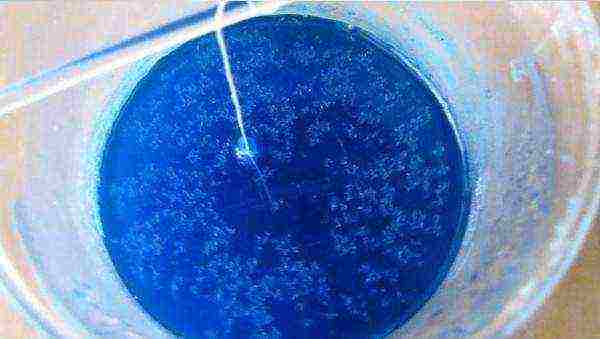
A saturated solution of vitriol will begin to form crystals on surfaces
- Remove the thread with the crystals formed from the container with the solution. Repeat the procedure: place the glass in a sand bath and heat so that the precipitate dissolves. Turn off heating. Without removing the dishes from the bath, cover it with a lid of a suitable diameter (for example, a petri dish) and let the solution cool slightly.
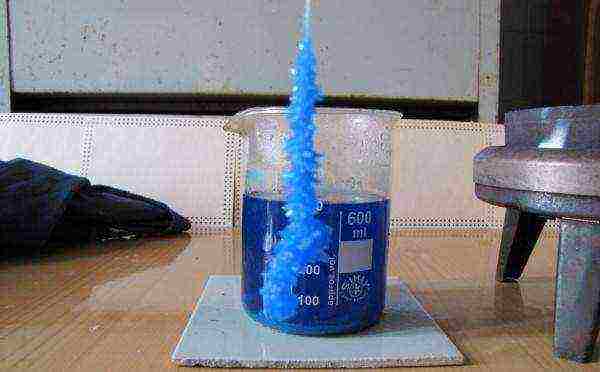
Thread with the first crystals
- Place the string with crystals in the solution, secure it so that it does not come into contact with the bottom and walls. Cover the container and leave overnight. In the morning you will find in a glass a large cluster of beautiful crystals of an unusual shape.
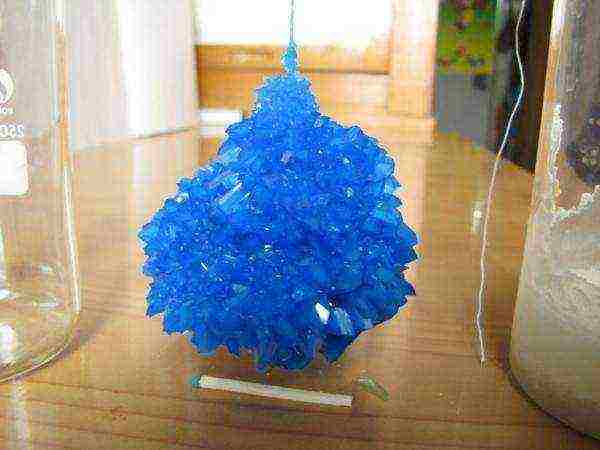
You can get such a crystal in a day.
- You can try to shape the cluster of crystals. To do this, you need to use wire instead of thread.... Bend it into a square, circle, heart, or star. The wire will become a strong stable frame for the future shaped crystal. If at the same time you need to limit the growth of some of the edges, lubricate them with petroleum jelly or grease.
By growing copper sulfate crystals quickly, you don't have to worry about seeding: you can do without it altogether. The sediment will easily fix on the thread.
Second way
In this case, you can grow a large crystal of copper sulfate, but it will take much longer. In addition, unlike the first method, the choice of the seed is fundamentally important. In addition, you will have to make sure that small crystals do not stick to it.
The larger and smoother the crystal of copper sulfate selected from the total mass, the more beautiful the final product will be.
You will need 200 g of warm water and about 110 g of copper sulfate.
Manufacturing instruction:
- mix vitriol and water in a suitable container (glass or jar), leave for a day. Stir occasionally: the active substance should completely dissolve. After that, filter the solution through cotton wool or special filter paper. The sediment remaining on the surface of the filter can be dried and used again if necessary;
- pour the resulting solution into a clean container;
- select a crystal for a seed, tie it to a thread (hair). Fix the other end of the thread on a stick, put it horizontally on the container. The seed should sink into the solution in a strictly vertical position. Cover the dishes with a piece of cloth so that dust does not get inside;
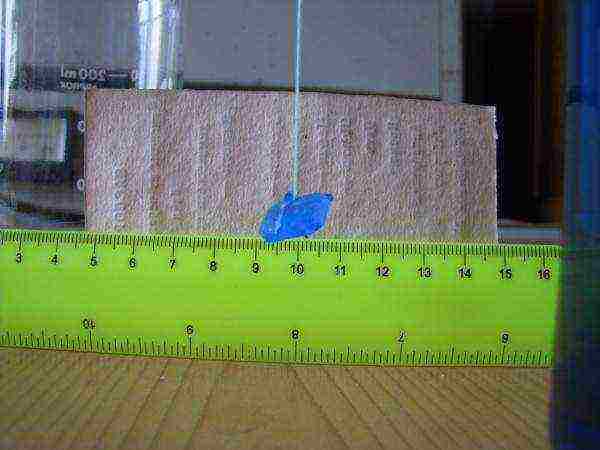
Copper sulfate crystal suitable for seeding
- after a few days you will notice that the crystal is growing. After a week, it will reach 1 cm, and over time it will increase even more;
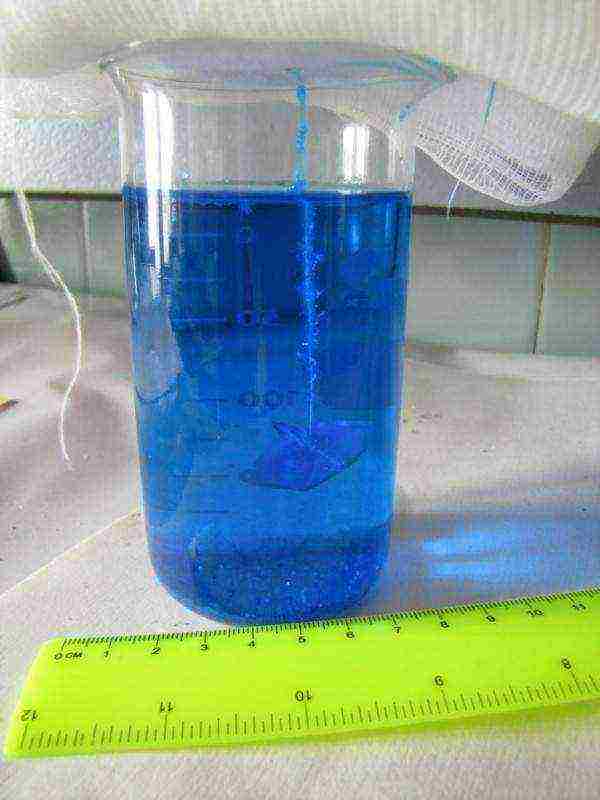
Be sure to cover the container with the solution and the seed with a piece of cloth.
While working, you may encounter some difficulties. They are easy to overcome by adhering to simple rules.
- If during the growth process additional small crystals are formed inside the container, the solution must be poured into a clean dish and the main crystal must be transferred there.
- Small crystals can form on the thread holding the seed over time. To avoid this, lift the main crystal a little higher: the smaller piece of filament will be in contact with the solution.
- You can experiment and use nylon thread instead of cotton or woolen thread. A thin copper wire is also suitable. But in this case, the seed will grow worse and the growth process will take longer.
- If the temperature rises in the room in which you are conducting the experiment, the seed may dissolve.Add a few tablespoons of copper sulfate to the solution and let it brew for 5-7 hours, stirring regularly. Drain the solution so that no sediment remains in it, and repeat the experiment.
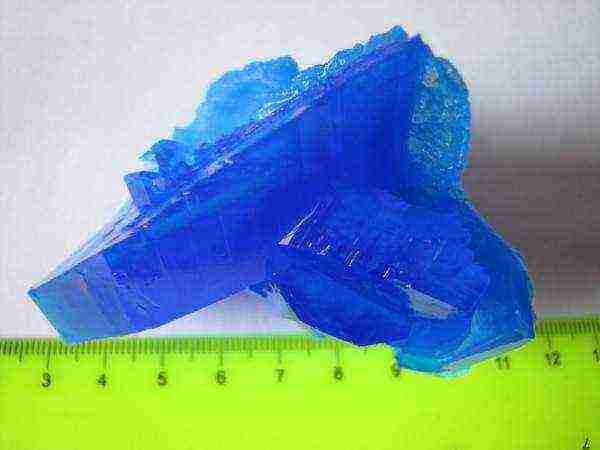
Large crystal obtained by long-term growth
When exposed to air, a crystal of copper sulfate loses some of its moisture, erodes and eventually collapses. To avoid this, store it in a tightly closed container in a cool place. Experts advise covering it with a colorless varnish - this will create a reliable protective film.
How to grow a crystal from copper sulfate at home (video)
Growing copper sulfate crystals is a long process, it requires attention and patience. However, the result will surely please you. Share your experience with us in the comments. Good luck to you!
Good afternoon! My name is Svetlana. This site has become for me not only an additional source of income, but also an opportunity to share my knowledge of housekeeping with you. Rate the article:
(15 votes, average: 4.7 out of 5)
Copper sulfate has a bright and rich blue color. Crystals are especially beautiful from it. They can be an original gift for friends and family or become a very interesting activity to create one. Copper sulfate crystals will become an original decor for the room. So how do you grow them yourself? The basic principles of manufacturing are described in this article.
1 How to grow a crystal from copper sulfate - material preparation
- This product is sold in agricultural stores. But when using it at home, it is worth remembering that copper sulfate is a toxic drug. It is used to kill pests in the fields. Therefore, when working with it, observe safety precautions: work only with rubber gloves, do not inhale the vapors of the solution with it, avoid contact with mucous membranes and eyes. Be sure to wash your hands after each work with the product and only under running water.
Important! Do not use tap water for the procedure. It contains chlorine, which will react with the agent and lower the quality of the finished crystal. If you don't have distilled water, then use boiled water.
Advice. Since the crystal will be transparent in color, use a thin thread to grow it, but strong. It will not be visible in the finished product, but it will hold the weight of the decor.
- When placing the thread in the container, make sure that it does not touch the sides of the container or the bottom. This will disrupt the structure of the crystal.
- Since the glass will have to be heated, use it with a thick base or use heat-resistant dishes.
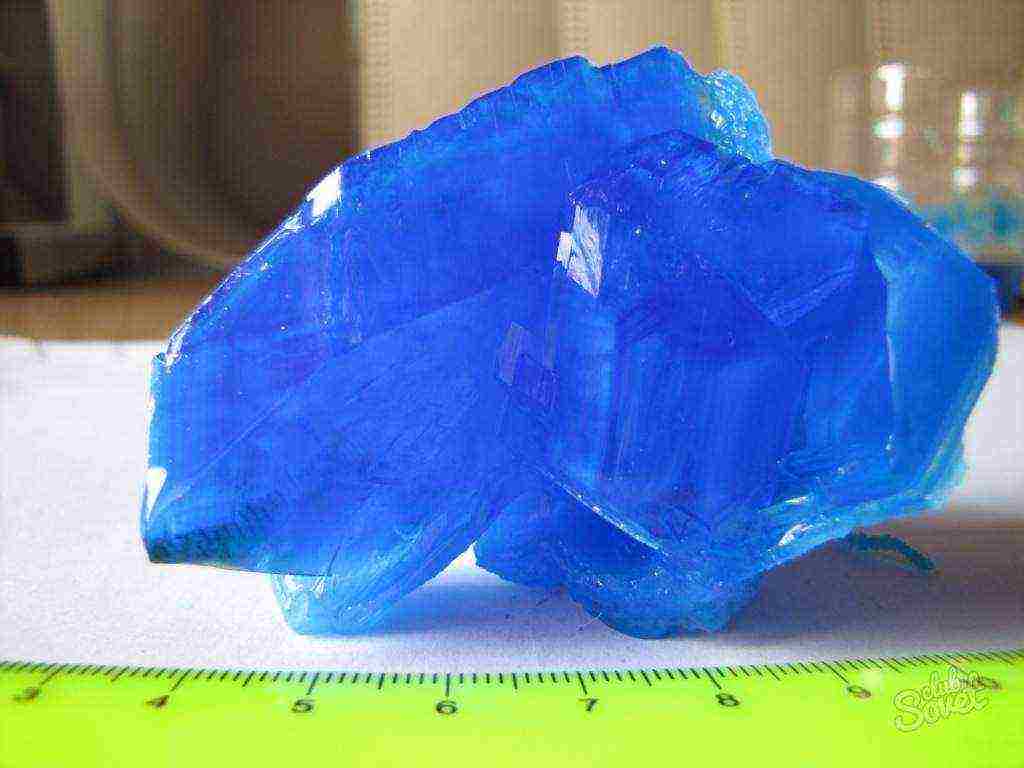
2 How to grow a crystal from copper sulfate - instructions and methods
- Today, there are two ways to grow copper sulfate crystals. Although the principle is the same: the gradual formation of build-ups, the result is crystals with a different structure. And also the cultivation will take different times.
- The fast method involves the formation of a crystal in a short time. It is suitable for those who do not like to wait and need a quick result. The whole process will take about a week. You will grow an elongated crystal with many small branches.
- If you want to grow a large crystal, then you will need a longer period of time and patience for this. But in the end, you will create an object that looks like a large gem.
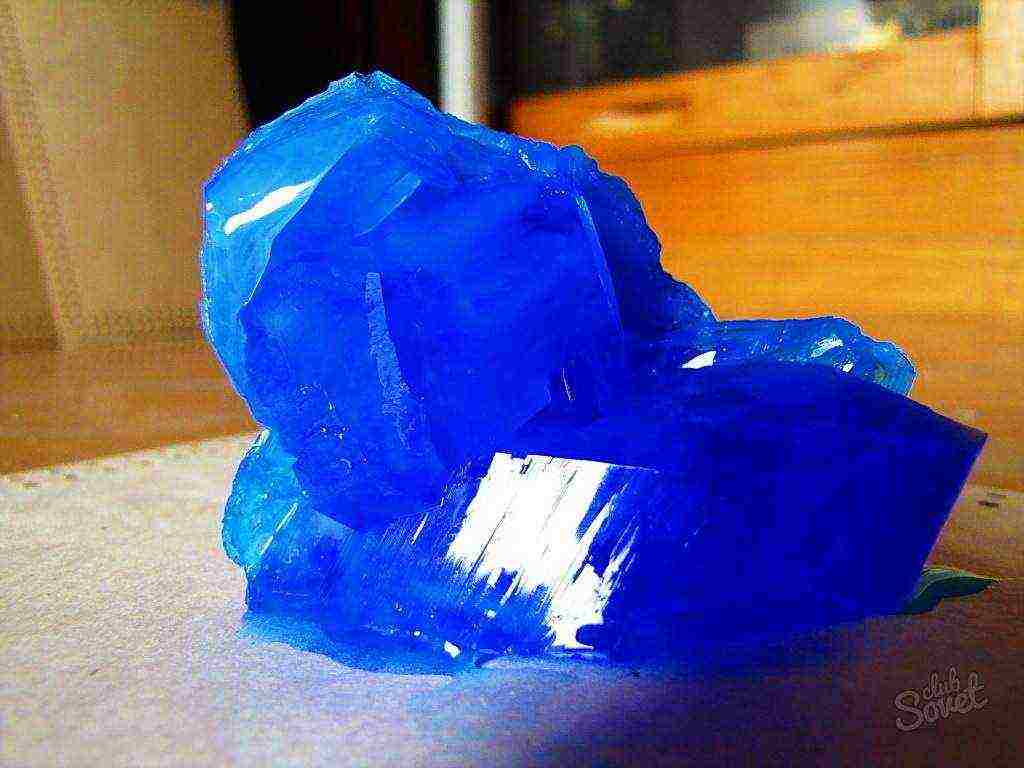
3 How to grow a crystal from copper sulfate - a quick option
- Prepare a container with a volume of half a liter. Pour 200 grams of powder into it and pour 300 ml of warm water. It should be on a sand stove. Stir the mixture well until the grains are completely dissolved.
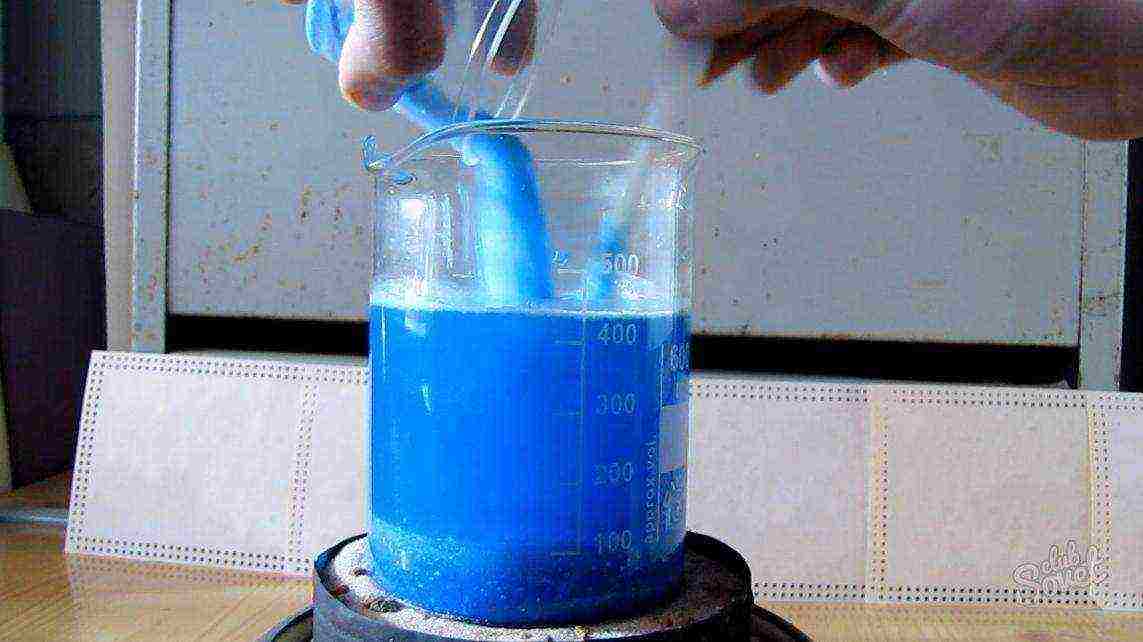
- Remove the container from the sand and place it on the table. Let the mixture cool. Tie a piece of vitriol to a thread - this will be a seed. Dip it in liquid.
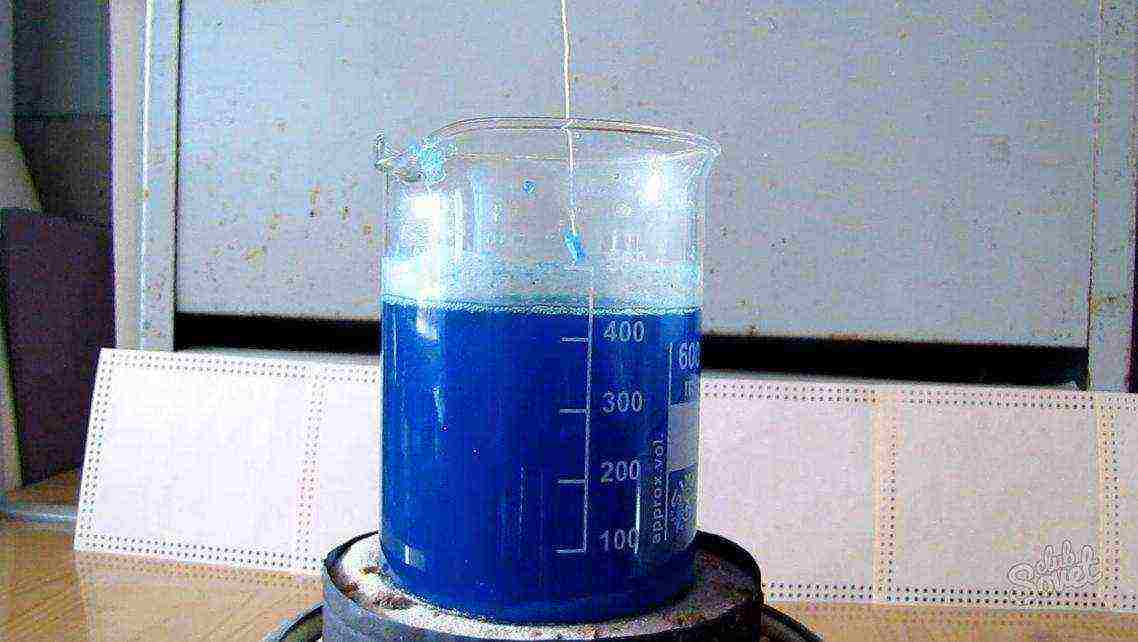
- Make sure that the thread starter does not touch the sides and bottom of the cookware. When the mixture cools down, the liberated salts will settle on the prepared base. For convenience, attach the thread to a pencil, which you place on the surface of the container. It will hold the thread vertically.
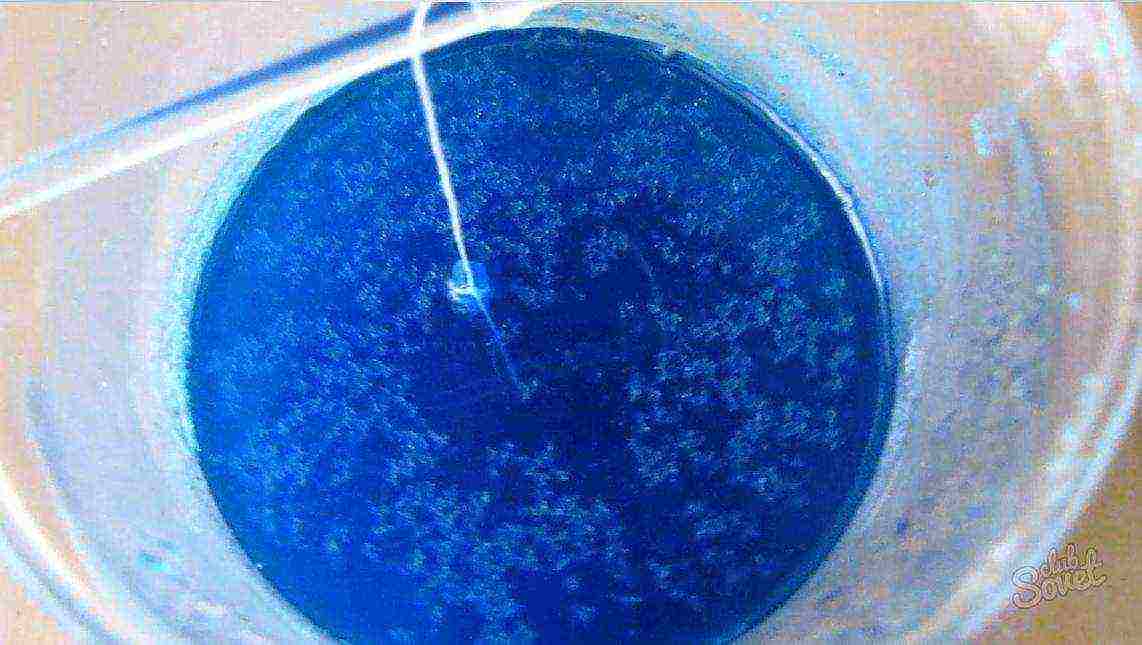
- After a day, remove the base, heat the container again. In this case, the powder that has settled to the bottom should completely melt. Cool the mixture and put the thread back into the container. Cover and leave for 12 hours. In a day, you will grow a brush of crystals on a thread. Repeat the procedure until the desired size is formed.
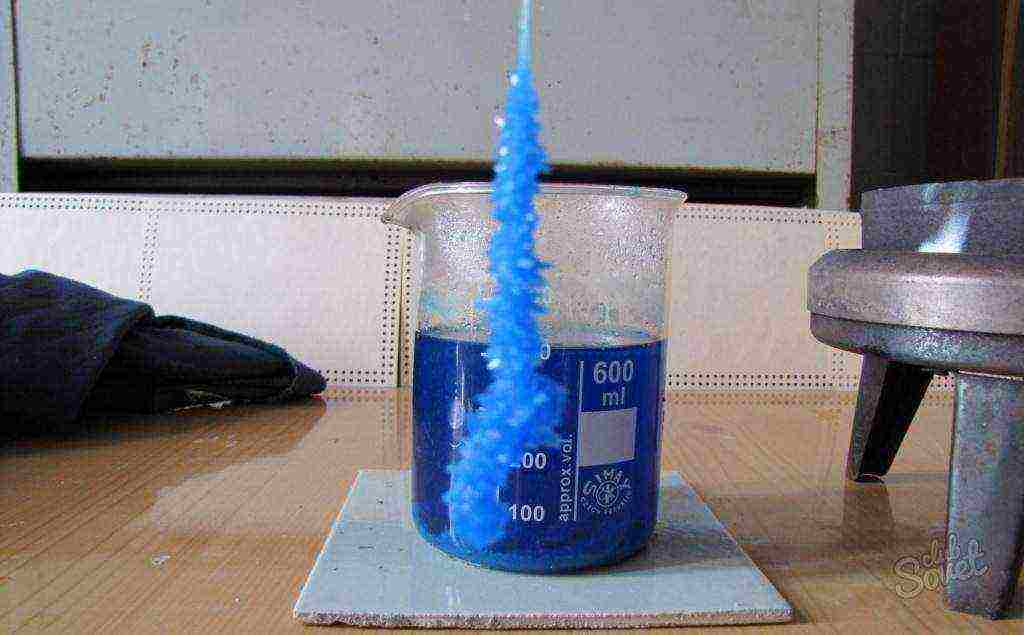
- For a specific crystal shape, use a wire instead of a base. Bend it into any shape, for example, in the form of a drop, and dip it into the mixture. But it should also not touch the walls and bottom of the container. In a week you will have such a bright crystal.
Advice. To form the edges of the crystal, lubricate them with oil, if their growth in a certain place is not needed.
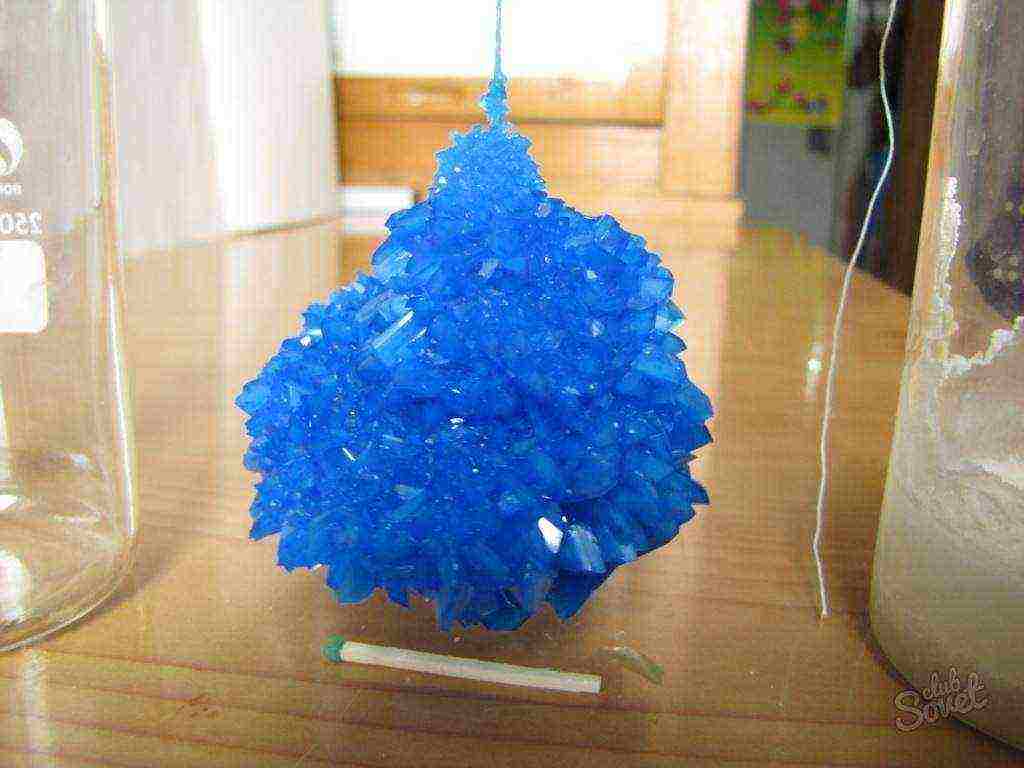
4 How to grow a crystal from copper sulfate - a long-term option
You will get large crystals with a flat surface when you grow it with a long method. But for this you will need not only a lot of time, but also attention. With this method, seeding is important and you will have to remove small crystals.
- Mix 110 grams of powder with 200 grams of warm water. Stir the solution well, set aside. Then stir it periodically until the powder grains are completely dissolved. Filter the resulting mixture. Use a cotton pad or paper filter for this.
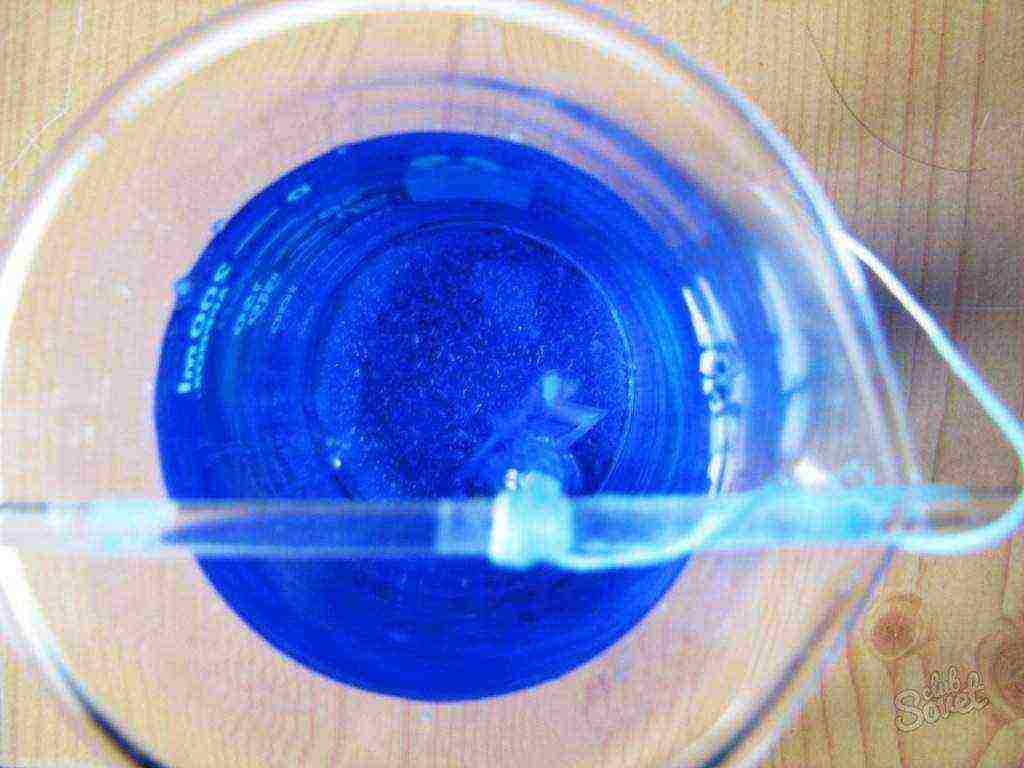
- Wash the container and pour the filtered solution into it.
- Among the crystals of the powder, find the largest one with even edges. Tie it on a thread and lower it into a container. It should be located inside strictly vertical, without touching the inner surface. Use a cloth to prevent dusty debris from entering the solution.
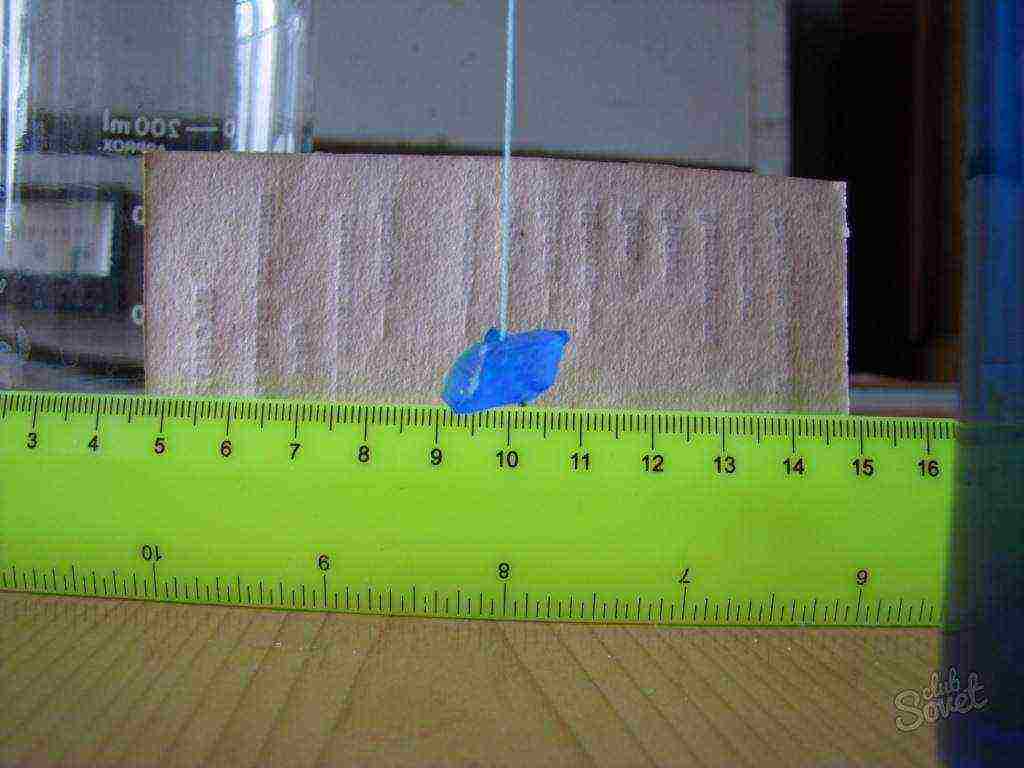
- In this method, you do not need to take out the thread and heat the mixture. After 10 days, the crystal will double in size. Continue growing it until you reach your desired volume.
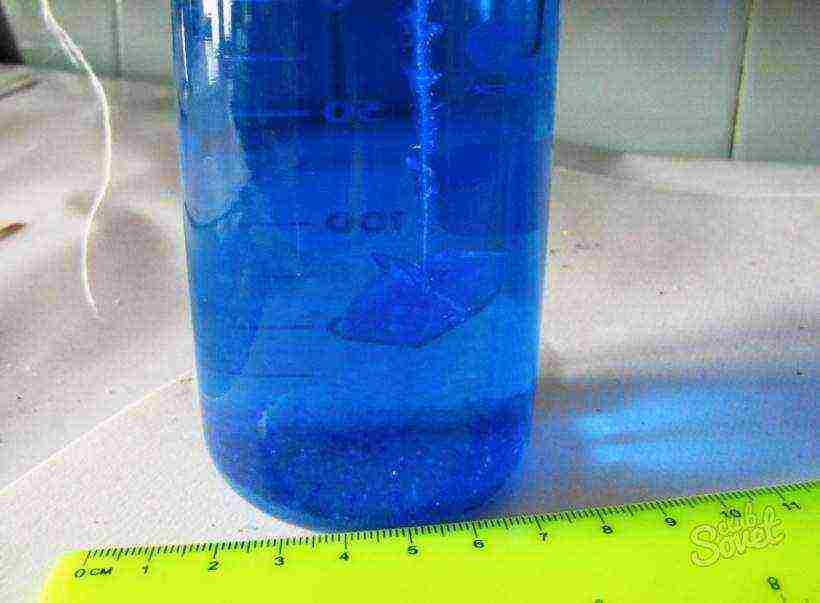
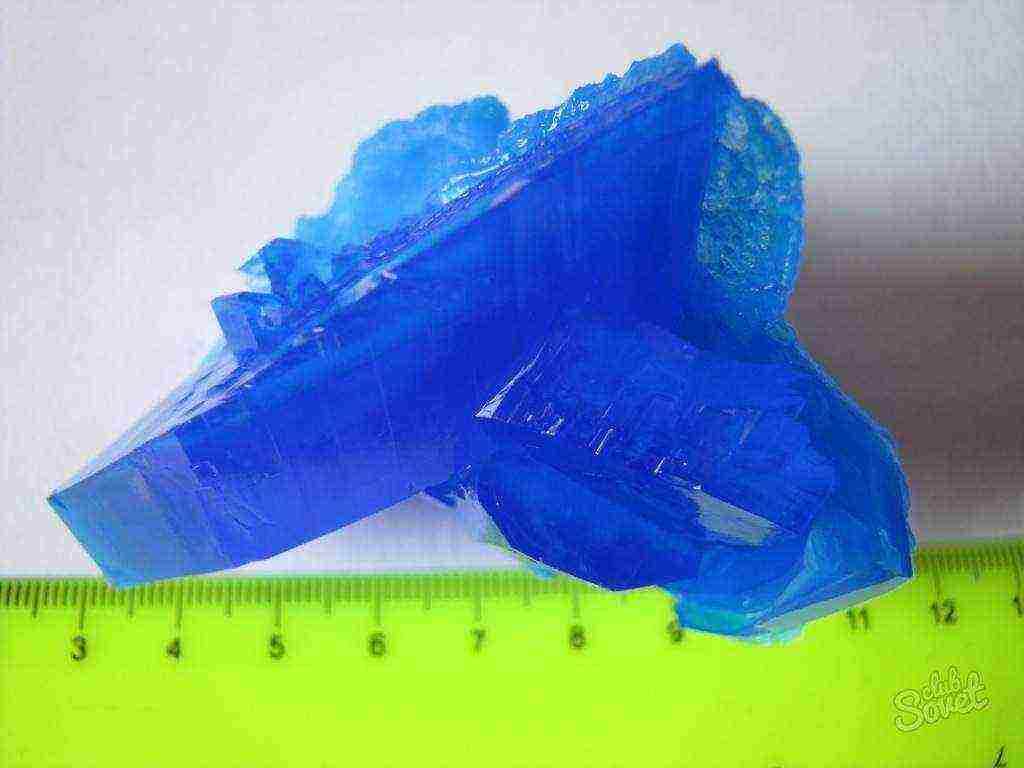
As you can see, it is not difficult to grow a crystal from copper sulfate, the main thing is patience and compliance with safety rules.
Copper sulfate is a substance that, due to its beautiful bright blue color, is ideal for growing crystals. They can be presented to your loved ones or used as a decorative element. In any case, they will not leave anyone indifferent, and the manufacturing process can become truly exciting. So, how to grow a crystal from copper sulfate?
Preparatory activities
Copper sulfate can be purchased at almost any hardware store. It is actively used in agriculture for pest control. However, one should not forget that this substance is toxic. When working with copper sulfate at home, be sure to use rubber gloves and do not allow it to enter the esophagus and mucous membranes. After finishing work, wash your hands thoroughly in running water.
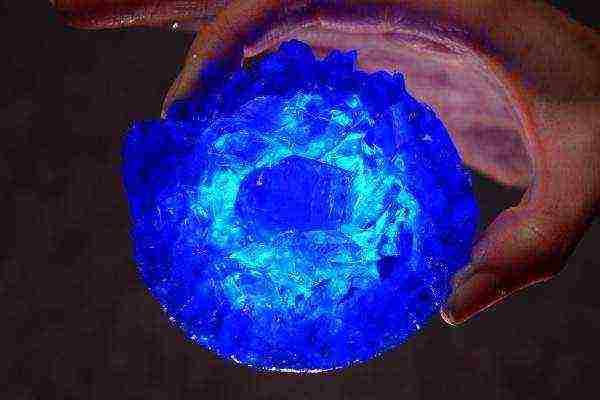
A real miracle can be grown from copper sulfate, but during the manufacturing process, do not forget about safety precautions
In order to make a crystal, you will need:
- water - if possible, use distilled or, in extreme cases, boiled. Raw tap water is categorically unsuitable due to the content of chlorides in it, which will react with the solution and worsen its quality;
- copper sulfate;
- Cup;
- wire;
- wool thread - make sure it is thin. Long hair can be used. Copper sulfate crystals are transparent, and the thread should not be visible through them.
When placing the seed in a container with a solution, make sure that it does not come into contact with the walls or the bottom of the container.This can disrupt the crystal growth process and its structure.
Crystal Growing Instructions
There are two technologies for growing crystals from copper sulfate.
- If you don't want to wait long, you can use the fast method. It will take about a week in time, and as a result you will get many small crystals, fixed one on top of the other, like a colony of mussel shells.
- The second method is more time consuming. It will help you grow a large, solid, gem-like crystal.
But both of them are based on working with a saturated solution of a substance.
Note! The higher the water temperature, the faster copper sulfate dissolves in it. But when the liquid reaches + 80C °, subsequent heating does not affect the solubility of salts in any way.
Fast way
- Take a 500 ml glass or jar, add 200 g of copper sulfate and fill them with 300 ml of water. Place the container in a sand bath and start heating, stirring constantly. Copper sulfate crystals must completely dissolve.
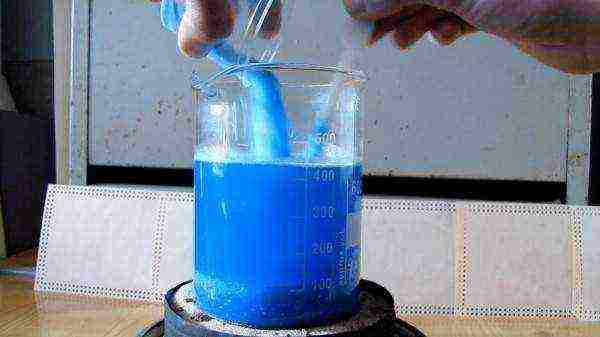
Dissolve copper sulfate thoroughly in warm water
- Remove the dishes from the sand bath, place them on a cool surface, such as ceramic tiles. The solution should cool slightly. Now you need to place a seed in it. It will serve as a crystal of copper sulfate, which must be selected in advance - the largest and evenest.

Place the seed in the solution
- Make sure that the seed does not come into contact with the inside of the glass. Even if the crystal dissolves, don't worry - it doesn't matter. When cooled, the saturated solution gives off salts that settle on the thread. The largest amount of vitriol will concentrate on the bottom of the dishes, since it is in this place that the glass contacts the cool surface.
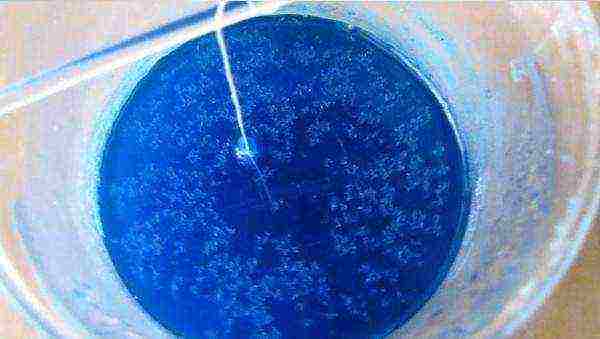
A saturated solution of vitriol will begin to form crystals on surfaces
- Remove the thread with the crystals formed from the container with the solution. Repeat the procedure: place the glass in a sand bath and heat so that the precipitate dissolves. Turn off heating. Without removing the dishes from the bath, cover it with a lid of a suitable diameter (for example, a petri dish) and let the solution cool slightly.
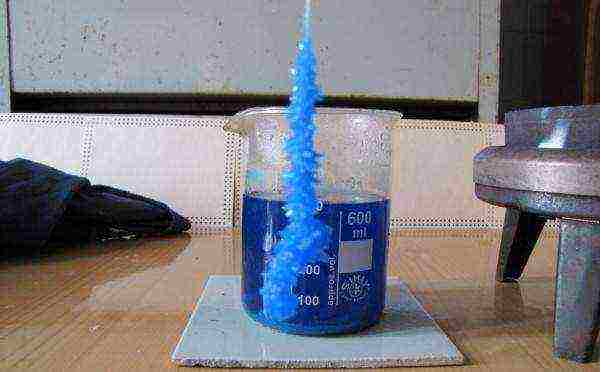
Thread with the first crystals
- Place the string with crystals in the solution, secure it so that it does not come into contact with the bottom and walls. Cover the container and leave overnight. In the morning you will find in a glass a large cluster of beautiful crystals of an unusual shape.
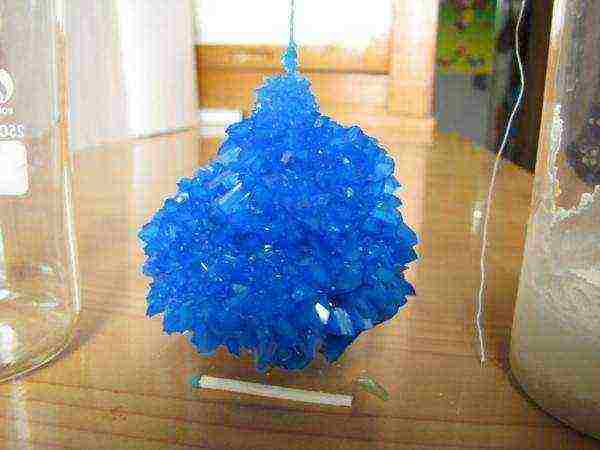
You can get such a crystal in a day.
- You can try to shape the cluster of crystals. To do this, you need to use wire instead of thread.... Bend it into a square, circle, heart, or star. The wire will become a strong stable frame for the future shaped crystal. If at the same time you need to limit the growth of some of the edges, lubricate them with petroleum jelly or grease.
By growing copper sulfate crystals quickly, you don't have to worry about seeding: you can do without it altogether. The sediment will easily fix on the thread.
Second way
In this case, you can grow a large crystal of copper sulfate, but it will take much longer. In addition, unlike the first method, the choice of the seed is fundamentally important. In addition, you will have to make sure that small crystals do not stick to it.
The larger and smoother the crystal of copper sulfate selected from the total mass, the more beautiful the final product will be.
You will need 200 g of warm water and about 110 g of copper sulfate.
Manufacturing instruction:
- mix vitriol and water in a suitable container (glass or jar), leave for a day. Stir occasionally: the active substance should completely dissolve. After that, filter the solution through cotton wool or special filter paper. The sediment remaining on the surface of the filter can be dried and used again if necessary;
- pour the resulting solution into a clean container;
- select a crystal for a seed, tie it to a thread (hair). Fix the other end of the thread on a stick, put it horizontally on the container. The seed should sink into the solution in a strictly vertical position. Cover the dishes with a piece of cloth so that dust does not get inside;
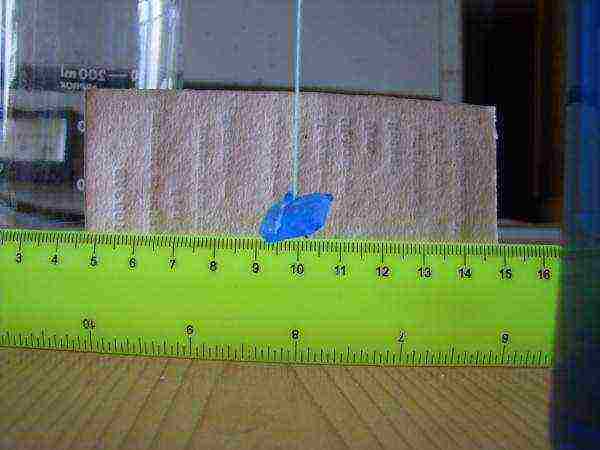
Copper sulfate crystal suitable for seeding
- after a few days you will notice that the crystal is growing. After a week, it will reach 1 cm, and over time it will increase even more;
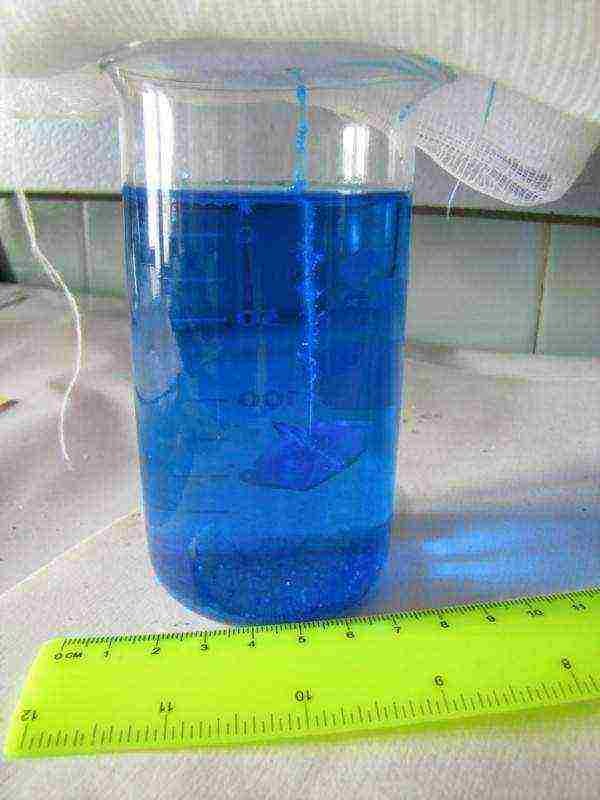
Be sure to cover the container with the solution and the seed with a piece of cloth.
While working, you may encounter some difficulties. They are easy to overcome by adhering to simple rules.
- If during the growth process additional small crystals are formed inside the container, the solution must be poured into a clean dish and the main crystal must be transferred there.
- Small crystals can form on the thread holding the seed over time. To avoid this, lift the main crystal a little higher: the smaller piece of filament will be in contact with the solution.
- You can experiment and use nylon thread instead of cotton or woolen thread. A thin copper wire is also suitable. But in this case, the seed will grow worse and the growth process will take longer.
- If the temperature rises in the room in which you are conducting the experiment, the seed may dissolve. Add a few tablespoons of copper sulfate to the solution and let it brew for 5-7 hours, stirring regularly. Drain the solution so that no sediment remains in it, and repeat the experiment.
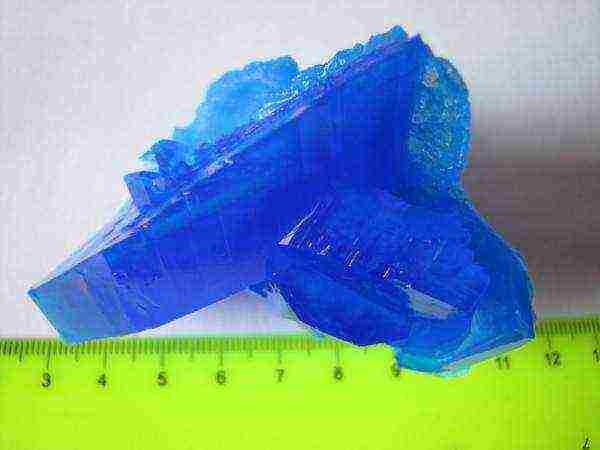
Large crystal obtained by long-term growth
When exposed to air, a crystal of copper sulfate loses some of its moisture, erodes and eventually collapses. To avoid this, store it in a tightly closed container in a cool place. Experts advise covering it with a colorless varnish - this will create a reliable protective film.
How to grow a crystal from copper sulfate at home (video)
Growing copper sulphate crystals is a long process, it requires attention and patience. However, the result will surely please you. Share your experience with us in the comments. Good luck to you!
Good afternoon! My name is Svetlana. This site has become for me not only an additional source of income, but also an opportunity to share my knowledge of housekeeping with you. Rate the article:
(15 votes, average: 4.7 out of 5)
There are many simple and exciting chemistry experiments that can be done with children. Start your acquaintance with the magical world of crystals right now!
At home, crystals of almost all salts can be grown, but it is better to start with technologically simple materials. These include table salt, sugar, borax and copper sulfate. The largest and most beautiful blue crystals are obtained from it. It is easy to grow them, at the same time it is a very interesting and educational process. Our article will help you grow a copper sulfate crystal at home step by step.
What is needed
Copper sulfate
You can buy copper sulfate at any gardening store. It is sold in packs of 100 grams. The blue color of household vitriol indicates a low degree of purification. Crystals from it are lighter.
Copper sulphate can also be purchased from specialized laboratories. From such vitriol, a dark blue crystal will grow, similar to a precious stone.
Container for working solution
Glassware is used because other materials react chemically with the solution. A half-liter jar with a wide mouth is perfect. After experience, it is strictly forbidden to use it for food purposes.
Basis for crystallization
A thin woolen thread of blue or black color is used as a base. The adult crystal is translucent and the base should not spoil the result. An alternative would be thin copper wire that has been pre-sanded with sandpaper.
Water
If you are using copper sulfate from a hardware store in the experiment, the water will need to be boiled. For the experiment with purified vitriol, distilled water is used.
Means of protection
Vitriol is toxic, and you cannot work with it without gloves. It is advisable to wear a medical mask for children of primary school age.
Pencil or stick to secure the base
On it you will hang a thread on which the crystal will grow.
Clear nail polish
To keep the crystal
Disposable plastic spoon
Important! The work is carried out only under the supervision of adults. At the end of the process, hands must be thoroughly washed under running water. You cannot taste the crystal or powder. If copper sulfate gets into your eyes, rinse them with plenty of water.
How to make a crystal: stages of work
High concentration working solution
Add copper sulphate to water heated to about 80 degrees. The liquid must be constantly stirred so that the powder is completely dissolved. It is important to maintain a constant temperature of the water, a water or sand bath can help. If copper sulfate stops dissolving and settles at the bottom, then the solution is ready. On average, 200 grams of the substance will be consumed per 300 ml of water.
Seed crystal
We move the container with the hot solution to the cooling surface and wait until the liquid cools down to room temperature. This is necessary for the precipitation of small crystals to begin. Having filtered the solution through cheesecloth, consider the crystals and choose the largest and most correct in shape. We will use it in what follows as a seed.
Crystal Growth Media
We reheat the strained solution in a water bath, again bringing it to a supersaturated state. If the resulting precipitate is not dissolved, repeat the cleaning. We tie the seed and place it in the jar so that the thread is vertical, without touching the bottom and walls of the container. To do this, we tie the thread to a pencil, and fix the pencil on the neck, for example, with plasticine. Here you will find detailed instructions and a scientific description of this experiment.
Crystal growth
We cover the dishes with a cloth and leave them stationary for seven days. Static structure is a prerequisite for the beginning of crystal formation. After a week, you can see that the thread is overgrown with small crystals of a millimeter in size, and the seed has increased by about 1 cm. The larger the crystal, the faster it grows. When you are satisfied with the result, dry the crystal and cover it with varnish - it will protect the product from white bloom during storage and give it additional shine.
From this experience, children will learn how and why crystals grow and will love to make scientific discoveries.
Hello everyone, young chemists and those who are older, and this day has come! Blog "Chemistry" opens perhaps the simplest, but requires a lot of patience experience, but patience is worth it. Today I will tell you how you can grow crystals and copper sulfate.

Copper sulfate is a substance that, due to its beautiful bright blue color, is ideal for growing crystals. They can be presented to your loved ones or used as a decorative element. In any case, they will not leave anyone indifferent, and the manufacturing process can become truly exciting. So, how to grow a crystal from copper sulfate?
Preparatory activities
Copper sulfate can be purchased at almost any hardware store. It is actively used in agriculture for pest control. However, one should not forget that this substance is toxic.When working with copper sulfate at home, be sure to use rubber gloves and do not allow it to enter the esophagus and mucous membranes. After finishing work, wash your hands thoroughly in running water.

A real miracle can be grown from copper sulfate, but do not forget about safety during the manufacturing process
In order to make a crystal, you will need:
water - if possible, use distilled or, in extreme cases, boiled. Raw tap water is categorically unsuitable due to the content of chlorides in it, which will react with the solution and worsen its quality;
copper sulfate;
Cup;
wire;
wool thread - make sure it is thin. Long hair can be used. Copper sulfate crystals are transparent, and the thread should not be visible through them.
When placing the seed in a container with a solution, make sure that it does not come into contact with the walls or the bottom of the container. This can disrupt the crystal growth process and its structure.
Crystal Growing Instructions
There are two technologies for growing crystals from copper sulfate.
1.If you don't want to wait long, you can use the fast method. It will take about a week in time, and as a result, you will get many small crystals, fixed one on top of the other, like a colony of mussel shells.
2. The second method is longer. It will help you grow a large, solid, gem-like crystal.
But both of them are based on working with a saturated solution of a substance.
Note! The higher the water temperature, the faster copper sulfate dissolves in it. But when the liquid reaches + 80C °, subsequent heating does not affect the solubility of salts in any way.
Fast way
1. Take a 500 ml glass or jar, add 200 g of copper sulfate and pour 300 ml of water over them. Place the container in a sand bath and start heating, stirring constantly. Copper sulfate crystals must completely dissolve.
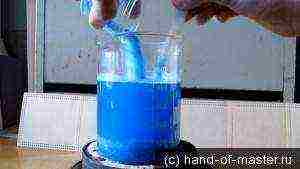
Dissolve copper sulfate thoroughly in warm water
2. Remove the dishes from the sand bath and place them on a cool surface such as ceramic tiles. The solution should cool slightly. Now you need to place a seed in it. It will serve as a crystal of copper sulfate, which must be selected in advance - the largest and evenest.
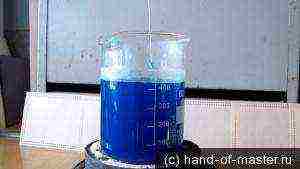
Place the seed in the solution
3. Make sure that the dummy bar does not come into contact with the inner surfaces of the bowl. Even if the crystal dissolves, don't worry - it doesn't matter. When cooled, the saturated solution gives off salts that settle on the thread. The largest amount of vitriol will concentrate on the bottom of the dishes, since it is in this place that the glass contacts the cool surface.
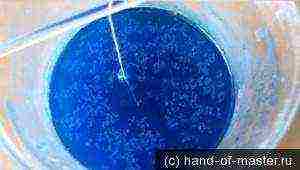
A saturated solution of vitriol will begin to form crystals on surfaces
4. Remove the thread with the formed crystals from the container with the solution. Repeat the procedure: place the glass in a sand bath and heat so that the precipitate dissolves. Turn off heating. Without removing the dishes from the bath, cover it with a lid of a suitable diameter (for example, a petri dish) and let the solution cool slightly.
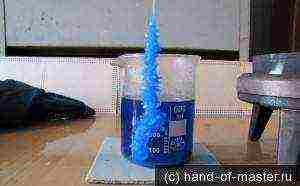
Thread with the first crystals
5. Place the string with crystals in the solution, secure it so that it does not come into contact with the bottom and walls. Cover the container and leave overnight. In the morning, you will find in a glass a large cluster of beautiful crystals of an unusual shape.
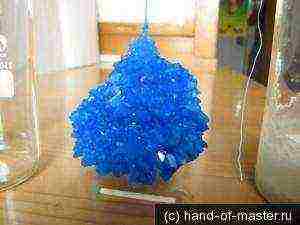
You can get such a crystal in a day.
6. You can try to shape the cluster of crystals. To do this, you need to use wire instead of thread. Bend it into a square, circle, heart, or star. The wire will become a strong stable frame for the future shaped crystal. If at the same time you need to limit the growth of some of the edges, lubricate them with petroleum jelly or grease.By growing copper sulfate crystals quickly, you don't have to worry about seeding: you can do without it altogether. The sediment will easily fix on the thread.
Second way
In this case, you can grow a large crystal of copper sulfate, but it will take much longer. In addition, unlike the first method, the choice of the seed is fundamentally important. In addition, you will have to make sure that small crystals do not stick to it. The larger and smoother the crystal of copper sulfate selected from the total mass, the more beautiful the final product will be.
You will need 200 g of warm water and about 110 g of copper sulfate.
Manufacturing instruction:
1.Mix vitriol and water in a suitable container (glass or jar), leave for a day. Stir occasionally: the active substance should completely dissolve. After that, filter the solution through cotton wool or special filter paper. The sediment remaining on the surface of the filter can be dried and used again if necessary;
2.Pour the resulting solution into a clean container;
3.Choose a crystal for a seed, tie it to a thread (hair). Fix the other end of the thread on a stick, put it horizontally on the container. The seed should sink into the solution in a strictly vertical position. Cover the dishes with a piece of cloth so that dust does not get inside;

Copper sulfate crystal suitable for seeding
4. After a few days, you will notice that the crystal is growing. After a week, it will reach 1 cm, and over time it will increase even more;
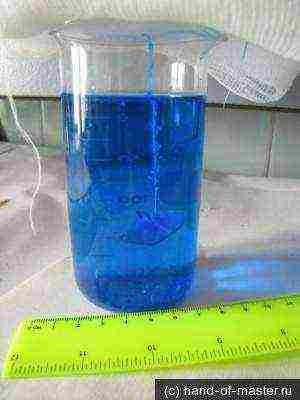
Be sure to cover the container with the solution and the seed with a piece of cloth.
While working, you may encounter some difficulties. They are easy to overcome by adhering to simple rules.
1. If during the growth process additional small crystals are formed inside the container, the solution must be poured into a clean dish and the main crystal must be transferred there.
2.On the thread holding the seed, small crystals may form over time. To avoid this, lift the main crystal a little higher: the smaller piece of filament will be in contact with the solution.
3. You can experiment and use nylon thread instead of cotton or woolen thread. A thin copper wire is also suitable. But in this case, the seed will grow worse and the growth process will take longer.
4. If the temperature rises in the room in which you are conducting the experiment, the seed may dissolve. Add a few tablespoons of copper sulfate to the solution and let it brew for 5-7 hours, stirring regularly. Drain the solution so that no sediment remains in it, and repeat the experiment.
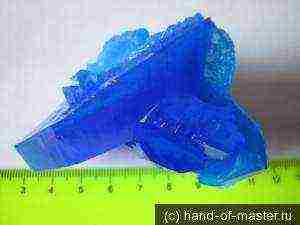
Large crystal obtained by long-term growth
When exposed to air, a crystal of copper sulfate loses some of its moisture, erodes and eventually collapses. To avoid this, store it in a tightly closed container in a cool place. Experts advise covering it with a colorless varnish - this will create a reliable protective film.
Taken from here:
/poleznye-sovety/kak-vyrastit-kristall-iz-mednogo-kuporosa-v-domashnix-usloviyax.html
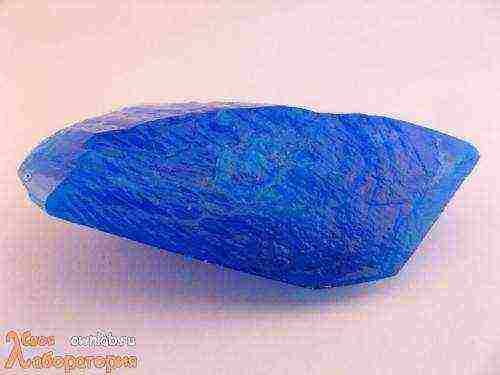
Crystal ... This word just breathes magic. I don't know what about the magical properties of crystals, but they definitely have a variety of useful physical properties. Crystals are widely used in modern electronics, optics and other fields of technology. And, of course, the crystals are just beautiful. They attract the eye with their regular shape and natural symmetry. And this applies not only to precious crystals, but also to crystals grown from improvised means.
We already know something about the crystalline state of matter from the article on crystals. Now is the time to move on to practical exercises 🙂
The crystal growth experiment has a number of features. One of these features is the duration of the experiment.The point is that a good and beautiful, and, most importantly, a large crystal cannot be grown quickly. This takes time. That is why the experience of growing crystals for nine days was developed under the heading Live Experiment, where you could observe the progress of the process and, perhaps, conduct your experiment in parallel. This article is a summary of the information obtained during the experience. So, an instruction for those who want to grow a crystal themselves.
For this we need:
- Water
- The container in which the crystal will grow. It is best if the container is transparent, such as a glass jar. In this case, it will be convenient to observe the progress of the process.
- A small piece of cardboard to cut out the lid for the container
- Funnel
- Filter paper or any material that can be used to filter the solution. You can use a napkin.
- Thread. It is better to take a thinner and smoother thread, for example, silk.
- And, of course, the substance from which we will grow the crystal. The experiment uses copper sulfate. The crystal from it should turn out to be a beautiful blue color. In addition, it is quite easy to get copper sulfate - it is usually sold in any gardening store. If you did not manage to find copper sulphate or are simply too lazy to go to the store, then you can use any crystalline substance, for example, ordinary table salt or sugar.
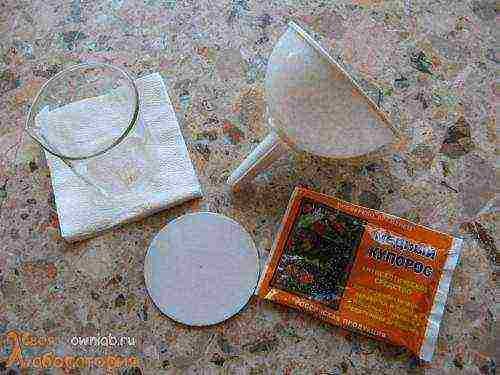
Before starting the experiment, I must warn you, in case you want to repeat it, about personal safety measures. You will be working with chemicals that can harm you. Do not use food containers for your experience, use protective equipment (gloves, glasses), wash your laboratory glassware thoroughly. If chemicals come into contact with skin or eyes, rinse thoroughly with water. If swallowed, consult a doctor.
Well, the formalities are over, let's get started.
Day 1.
As I said before, growing crystals is a procedure that has some peculiarities. Another feature of this experiment, in addition to the duration, is the need to grow the so-called seed, i.e. a small crystal, on the basis of which a large crystal will grow. You can do without a seed, but in this case it is difficult to grow a beautiful single crystal. Therefore, it is better to grow the seed all the same, especially since there is nothing complicated in this.
Let's prepare a saturated solution.
Let's pour a little copper sulfate into a glass container (hereinafter I will talk about copper sulfate, since it is he who participates in the experiment, you use the substance that you managed to find).
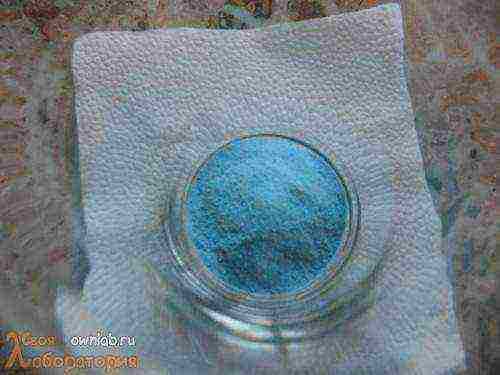
Pour salt (and copper sulfate is sulfur-copper salt) with a little hot water. The use of hot water is compulsory because at elevated temperatures, the solubility of salts increases.

It is better to place the container in a water bath so that the solution does not cool ahead of time.
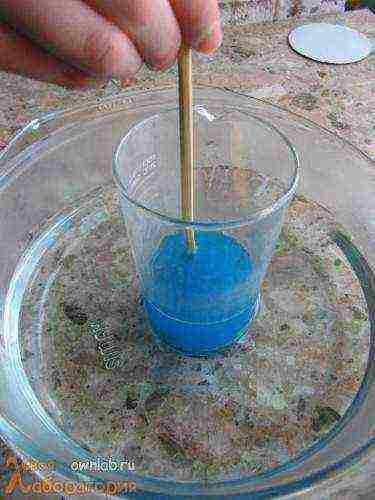
Stir the salt until dissolved, then add more salt and stir again. We repeat this until the salt stops dissolving in water.
Thus, we got a saturated salt solution.
Now the resulting solution needs to be filtered. This must be done so that no foreign particles, such as dust or impurities, remain in the solution. Foreign particles can serve as additional crystallization centers, i.e. other crystals will begin to form around them, but we do not need this. At this stage of the experiment, this is not very critical, but later the purity of the solution will be very important.
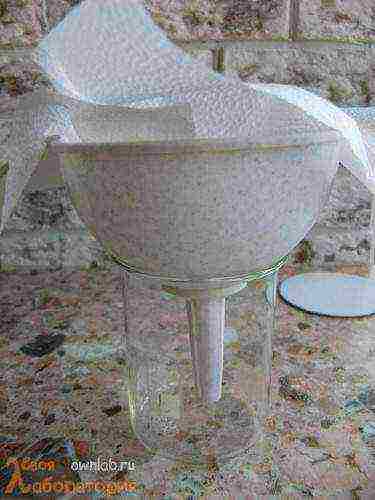
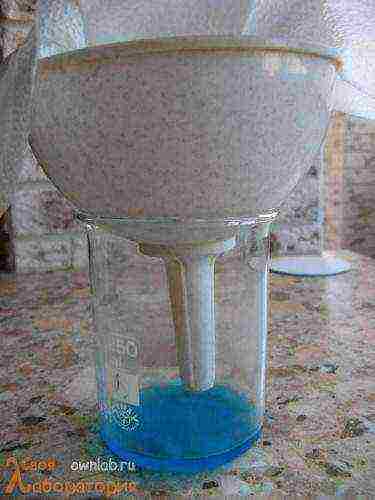
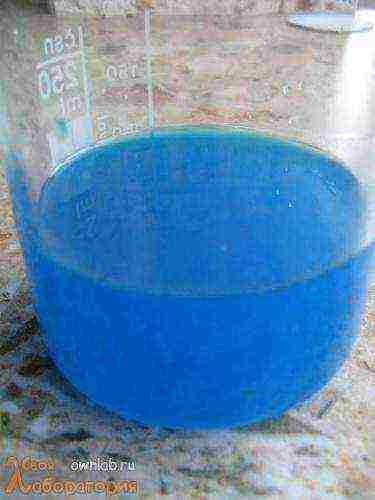
After it has been filtered, several salt crystals need to be thrown into the solution - seeds will begin to form on them.
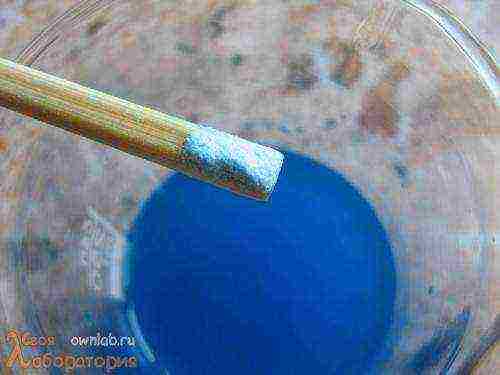
Now the container needs to be placed in a place where a more or less constant temperature regime will be ensured (the window sill is great for this), and covered with something to prevent impurities from entering.
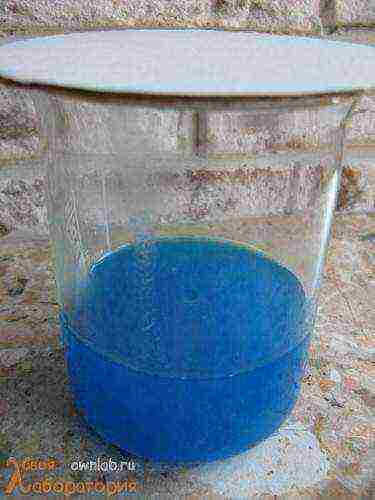
The solution will start to cool and oversaturate, i.e. salt will begin to become more in solution than it can dissolve at a given temperature. The salt will begin to crystallize, and the grains of salt that we added to the saturated solution will become the centers of crystallization. You will need to wait 2-3 days. After that, let's proceed to the next stage of the experiment.
Day 2.
It can be seen that crystals began to form at the bottom of the vessel.
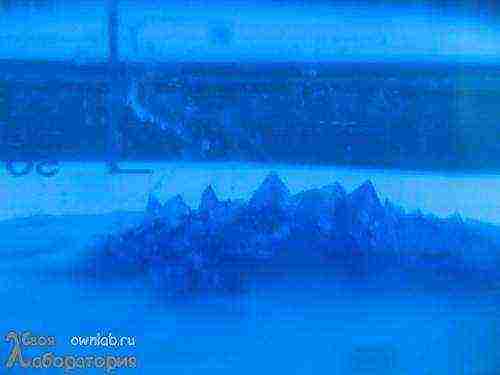
Day 3.
Crystals have grown. In principle, they are large enough to be used as a seed, but I will try to sustain them for another day.

Day 4.
Well, enough time has passed, and we have formed a good material for seeding. It remains to choose a suitable candidate.
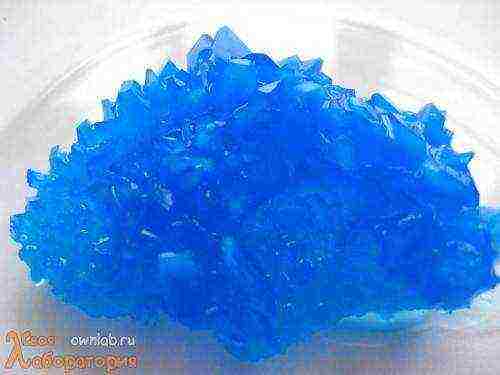
Pretty pretty already, isn't it? But we will not stop there and will continue our experiment.
It seems that the resulting mass of crystals is a monolith, but in fact it is not difficult to separate the crystals.

Try to choose the most correct crystal shape. I chose not the largest one available, but I liked its shape the most. The more correct the seed shape is, the more correct the crystal shape will be in the future. To make it easier to understand the size of the seed, I put a match next to it.
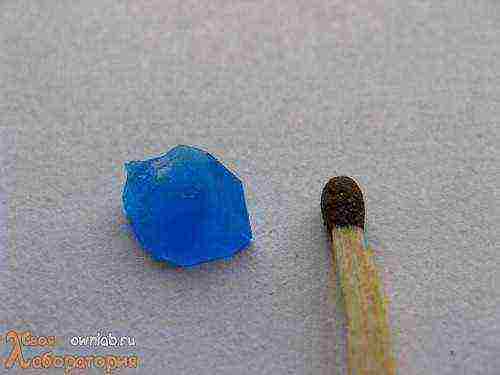
Now you need to tie a thread to the seed. As I wrote at the beginning of the article, it is better to take a thread that is less fleecy so that no side crystals form on its protruding villi. Do not use wire for suspension.
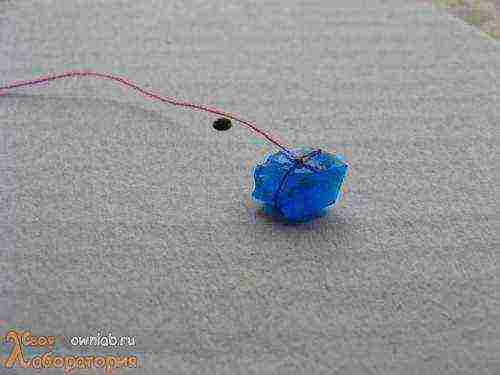
Now the thread with the dummy must be passed through the lid of the container and fixed on the back side. You need to fix it so that at any time it is possible to adjust the height of the suspension. For example, you can wind the excess thread on a match from the back side or secure the thread with a paper clip.
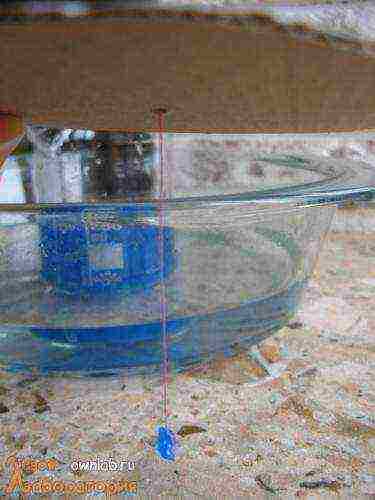
Now we need to prepare a fresh salt solution. It is done in the same way as for seeding: dissolving salt in hot water until it stops dissolving, filtering the solution. We put our seed into this fresh solution. Make sure that the seed does not touch the bottom and walls of the container, otherwise the crystal will begin to grow in an irregular shape.
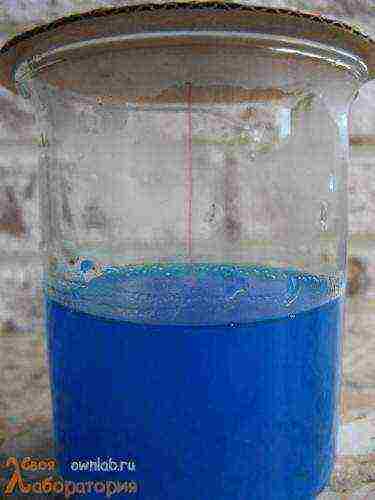
And now we have two paths. The first one is more complicated. It requires more attention and effort. The fact is that the most beautiful and regular crystals are obtained when the crystallization process is slow. Therefore, we need to ensure smooth cooling of the salt solution. To do this, we need to place our container with a seed in thermal vessels, constantly monitor the temperature of the solution. In simple terms, there is a lot of fuss. But the reward for such efforts is worthwhile - the crystal will turn out to be as pure and correct as possible.
The second way is much easier. You have placed the seed in a hot solution and you can forget about it for a while, leaving the crystallization process to chance. With this method, the growing crystal may not be of ideal shape, but the growth process will be faster.
I chose the second path. In the end, after following a simpler path and gaining some experience, I can always do a more complex version of the experiment. In addition, you need to keep in mind that a quick version of the experience does not mean at all that it can be done in a couple of hours. Even with an accelerated experience, the crystal will grow for several days. In the case of a long-term variant, the experiment may take 1 - 2 months.
But in both cases, you need to monitor the growth of the crystal. Once again, you do not need to take out the crystal and touch it - this may affect its shape. If side crystals begin to form on a crystal or thread, they must be carefully removed so that they also do not spoil the shape of the main crystal.
And one moment. If you dipped the seed into the solution, and it did not begin to increase, but quite the opposite, dissolves, then this means that you have prepared an unsaturated solution. The procedure for preparing the solution will have to be repeated.
So we continue to monitor the growth of the crystal. If you have any questions, you can contact me in the comments or through the feedback form.
Day 5.
During the day, the crystal has grown significantly.In the photo there is a crystal in comparison with a match and a crystal - a substitute for the seed, which I left yesterday just in case.
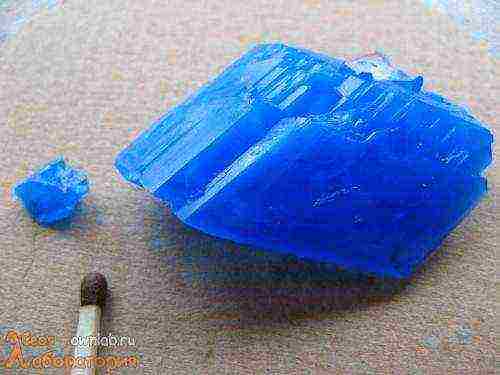
However, as you can see, the shape of the crystal is not ideal, there are many defects. This is the result of rapid crystal growth. But I still like him 🙂
I renewed the solution as I had done before, and put the crystal there again. Since the size of the crystal increased significantly compared to the previous day, it was necessary to adjust the height of the suspension of the seed. The experiment continues.
Day 6.
The crystal has grown. I renewed the copper sulfate solution again.
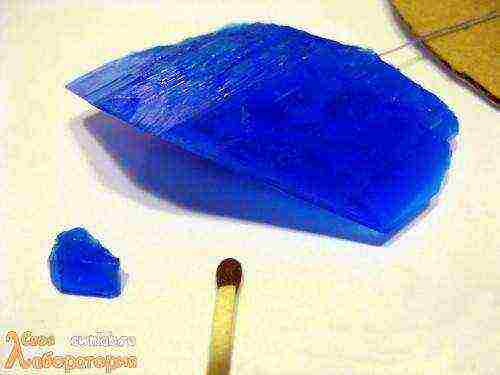
Day 7.
The crystal barely fits into my glass! Do not forget to clean the thread from growing small crystals.
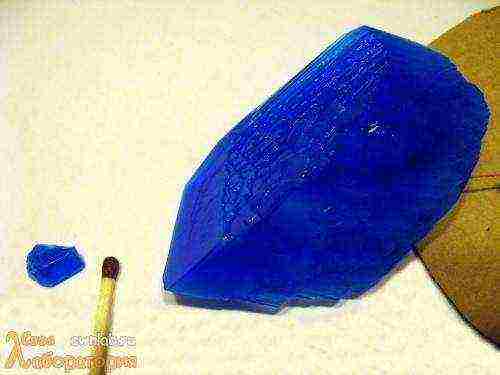
Day 8.
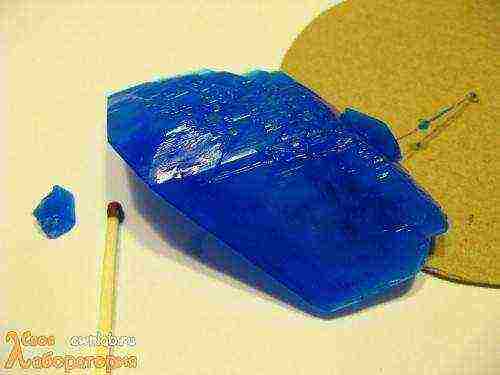
Day 9.
Well, here has come, I believe, the last day of the experiment. The latter is not because the crystal will not be able to grow further, but because it has become cramped in my laboratory glassware. We take out the crystal, cut a thread to its very root and blot it with napkins. We are one step away from admiring our work of art. The fact is that if you leave the crystal as it is, it will collapse pretty soon. To prevent this from happening, it must be "dressed" in a protective shell. The best option is to cover it with clear varnish. You can also place it in a hermetically sealed container, for example, in a jar. But it seems to me that the best option is to cover it with varnish. This will give it an additional shine, and it will be possible to observe it, as they say, live, and not through glass.
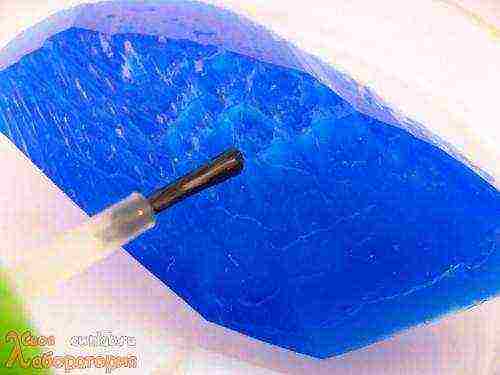
And now you can take a good look at the crystal. Of course, its shape was not perfect. But I deliberately chose the fast path of crystal growth instead of the quality one. In any case, I was pleased with the result. In nine days, the crystal has grown more than seven centimeters in length - a pretty good result!
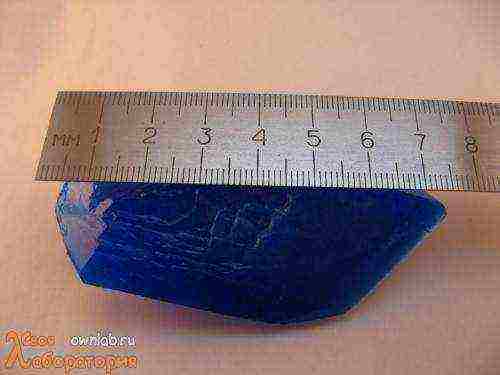
I even wanted to give it a name. They give names to large and unique gemstones. For example, how the famous diamond was named "Count Orlov". My crystal, of course, is far from a diamond, but it is dear to me in its own way 🙂 Therefore, not without a share of humor, I decided to call the resulting seven-centimeter pebble Kid.
At this point, the experiment can be considered over. And in the end - a few photos of the Kid.
Good luck with your experiments!
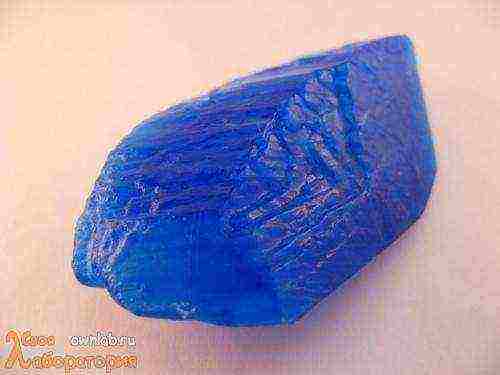
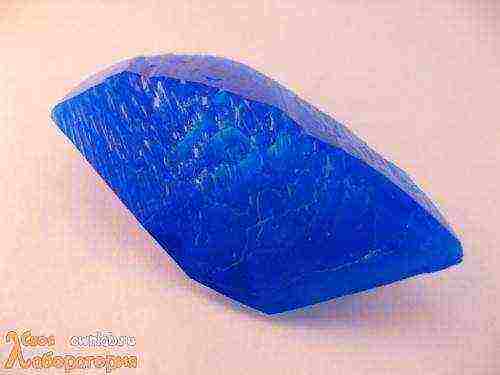


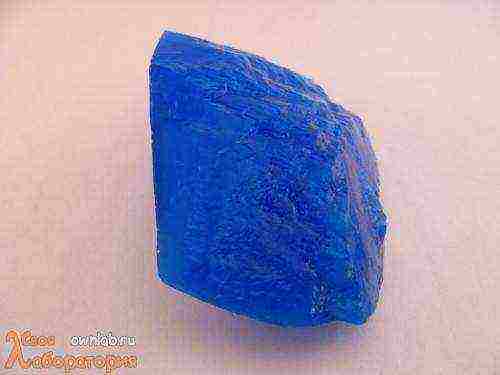
There are many simple and exciting chemistry experiments that can be done with children. Start your acquaintance with the magical world of crystals right now!
At home, crystals of almost all salts can be grown, but it is better to start with technologically simple materials. These include table salt, sugar, borax and copper sulfate. The largest and most beautiful blue crystals are obtained from it. It is easy to grow them, at the same time it is a very interesting and educational process. Our article will help you grow a copper sulfate crystal at home step by step.
What is needed
Copper sulfate
You can buy copper sulfate at any gardening hardware store. It is sold in packs of 100 grams. The blue color of household vitriol indicates a low degree of purification. Crystals from it are lighter.
Copper sulphate can also be purchased from specialized laboratories. From such vitriol, a dark blue crystal will grow, similar to a precious stone.
Container for working solution
Glassware is used because other materials react chemically with the solution. A half-liter jar with a wide mouth is perfect. After experience, it is strictly forbidden to use it for food purposes.
Basis for crystallization
A thin woolen thread of blue or black color is used as a base. The adult crystal is translucent and the base should not spoil the result. An alternative would be thin copper wire that has been pre-sanded with sandpaper.
Water
If you are using copper sulfate from a hardware store in your experiment, the water will need to be boiled. For the experiment with purified vitriol, distilled water is used.
Means of protection
Vitriol is toxic, and you cannot work with it without gloves. It is advisable to wear a medical mask for children of primary school age.
Pencil or stick to secure the base
On it you will hang a thread on which the crystal will grow.
Clear nail polish
To keep the crystal
Disposable plastic spoon
Important! The work is carried out only under the supervision of adults. At the end of the process, hands must be thoroughly washed under running water. You cannot taste the crystal or powder. If copper sulfate gets into your eyes, rinse them with plenty of water.
How to make a crystal: stages of work
High concentration working solution
Add copper sulphate to water heated to about 80 degrees. The liquid must be constantly stirred so that the powder is completely dissolved. It is important to maintain a constant temperature of the water, a water or sand bath can help. If copper sulfate stops dissolving and settles at the bottom, then the solution is ready. On average, 200 grams of the substance will go to 300 ml of water.
Seed crystal
We move the container with the hot solution to the cooling surface and wait until the liquid cools down to room temperature. This is necessary for the precipitation of small crystals to begin. Having filtered the solution through cheesecloth, consider the crystals and choose the largest and most correct in shape. We will use it in what follows as a seed.
Crystal Growth Media
We reheat the strained solution in a water bath, again bringing it to a supersaturated state. If the resulting precipitate is not dissolved, repeat the cleaning. We tie the seed and place it in the jar so that the thread is vertical, without touching the bottom and walls of the container. To do this, we tie the thread to the pencil, and fix the pencil on the neck, for example, with plasticine. Here you will find detailed instructions and a scientific description of this experiment.
Crystal growth
Cover the dishes with a cloth and leave them stationary for seven days. The static structure is a prerequisite for the beginning of crystal formation. After a week, you can see that the thread is overgrown with small crystals of a millimeter in size, and the seed has increased by about 1 cm. The larger the crystal, the faster it grows. When you are satisfied with the result, dry the crystal and cover it with varnish - it will protect the product from white bloom during storage and give it additional shine.
From this experience, children will learn how and why crystals grow and will love to make scientific discoveries.

